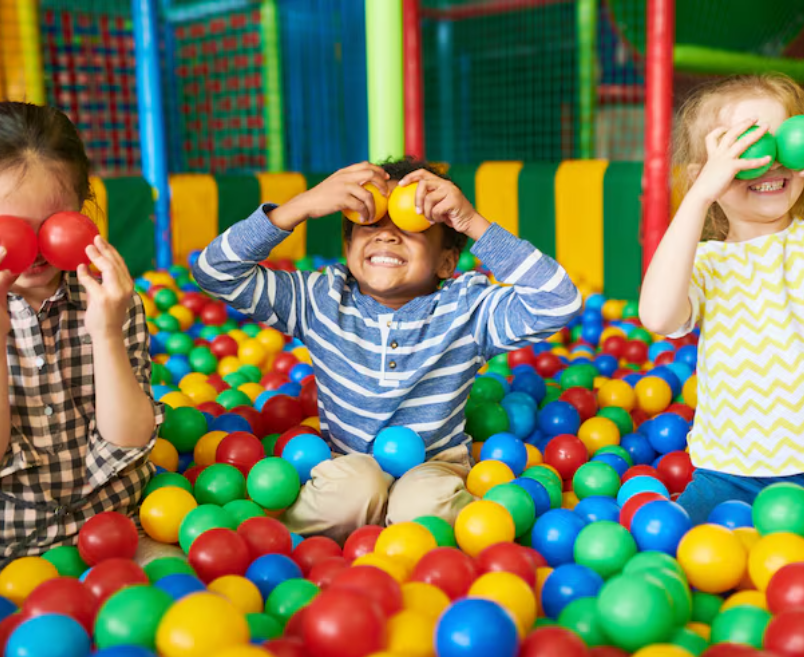
Wonderland Play Cafe: Analyzing the Evolution of the UK Soft Play Centre Model
November 18, 2025
The traditional soft play centre in the UK has undergone a significant transformation in the last two decades. No longer merely a vast warehouse dedicated solely to climbing frames and ball pits, the contemporary indoor play space has integrated sophisticated hospitality services. This evolution has given rise to the Play Cafe model, with venues like Wonderland Play Cafe becoming a prime example of this hybrid approach. This model successfully merges the high-energy physical demands of soft play with the relaxed, social requirements of a modern coffee shop, creating a dual-function community hub essential for modern family life.
This article explores the structure, functionality, and crucial developmental role of the Wonderland Play Cafe model within the UK’s landscape of children’s indoor facilities, focusing on its unique ability to cater simultaneously to both child and adult needs.
I. The Fusion of Play and Hospitality
The core innovation of the Wonderland Play Cafe concept is the seamless integration of two previously distinct businesses: the adventure soft play centre and the modern, high-quality cafe. This fusion is not simply an added amenity but a foundational element of the facility's design and operational success.
A. Dual-Purpose Design
In a typical Wonderland Play Cafe, the physical layout is meticulously planned to optimize both play and parental supervision. The soft play structure, while complex and multi-level, is positioned to allow for maximum visibility from the cafe seating area. This serves several critical functions:
Parental Assurance: High visibility reduces parental stress, allowing adults to relax and socialize while maintaining passive supervision over their children, directly addressing a primary concern of UK parents.
Safety Zone Integration: The cafe area often includes a segregated zone—sometimes called a 'Wonder Tots' area—which caters specifically to babies and toddlers (typically 0-3 years). This zone is typically comprised of low-level, interactive play features, safeguarding the youngest children from the more vigorous activity of older kids in the main frame.
The Café Standard: Unlike older, concession-stand models, the Play Cafe invests heavily in the quality of its hospitality. Offerings often include barista-style coffee, an extensive menu of light meals, and options that cater to various dietary requirements for both children and adults. This elevates the experience, encouraging longer visits and repeat business based on the quality of the adult environment, not just the play facilities.
II. Developmental Benefits in a Structured Environment
The soft play structure within the Wonderland Play Cafe adheres to strict UK and European safety standards (BS EN 1176), ensuring a risk-assessed environment that supports critical childhood development stages.
A. Fostering Physical Competence
The play frame is an engineered environment for the development of gross motor skills. Climbing, crawling, and maneuvering through the multi-level architecture directly contributes to:
Proprioception and Balance: Wobbly bridges, uneven platforms, and flexible obstacles challenge the child's sense of spatial awareness and stability. Success in navigating these areas enhances their body control and confidence in movement.
Core Strength and Endurance: The sustained, self-directed activity provides high-intensity exercise that builds core stability and cardiovascular fitness, offering an essential outlet regardless of external weather conditions.
B. The Role of Imaginative Play
Many Play Cafes supplement the large soft play structure with dedicated role-play areas—often themed as miniature villages, shops, or hospitals. These areas are crucial for cognitive development:
Symbolic Thought: They provide props and settings for children to engage in symbolic play, where they assign meaning to objects and roles (e.g., a plastic fruit becomes an actual item for sale).
Social Scripting: Role-play facilitates the practicing of social "scripts"—how to interact in a shop, how to care for a patient, etc.—which aids the development of emotional intelligence and social competence.
III. The Play Cafe as a Social and Community Catalyst
The Wonderland Play Cafe model has a profound impact on the adults and the community surrounding it, transforming the facility from a simple entertainment venue into a vital social infrastructure.
A. Parental Well-being and Socialisation
For parents, particularly those with pre-school children who may experience social isolation, the Play Cafe serves as a crucial meeting ground.
Adult Social Hub: The presence of high-quality coffee and comfortable seating encourages adults to stay, chat, and form networks. This parental socialisation is often cited as a key mental health benefit of these spaces.
Work/Life Balance: Many cafes offer Wi-Fi, allowing parents a brief window to manage low-priority work tasks while their children are safely and actively engaged, bridging the gap between home responsibilities and professional life.
B. Facilitation of Structured Groups
The Play Cafe's calm, hospitality-focused environment makes it an ideal venue for structured activities that support specific developmental milestones, such as:
Toddler Sensory Sessions: Utilizing the 'Wonder Tots' area for controlled sensory exploration (e.g., messy play, music, and lights).
Parenting Groups: Offering a neutral, supervised space for baby massage or ante-natal groups, integrating expert services with casual playtime.
IV. Operational Success and the Future Outlook
The commercial success of the Wonderland Play Cafe model in the UK hinges on its ability to generate revenue from two distinct streams: the entry fee for play and the higher-margin sales from the café.
Maximizing Dwell Time: By providing a comfortable adult environment, the café increases the average length of stay, which in turn encourages greater spending on food and beverages.
The Party Package: The facilities are inherently suited for birthday parties, offering streamlined, all-inclusive packages that generate predictable high-volume revenue. The 'Wonderland' theme, often associated with fantasy and celebration, is directly beneficial to this party market.
In conclusion, the Wonderland Play Cafe represents the sophisticated evolution of the UK soft play centre. It is a carefully calibrated environment that understands the contemporary family's demand for integrated solutions. By combining rigorous safety standards with critical developmental opportunities for children, while simultaneously providing a high-quality social and recreational hub for adults, this model has cemented its place not just as an entertainment option, but as an indispensable piece of modern British community and family infrastructure.












